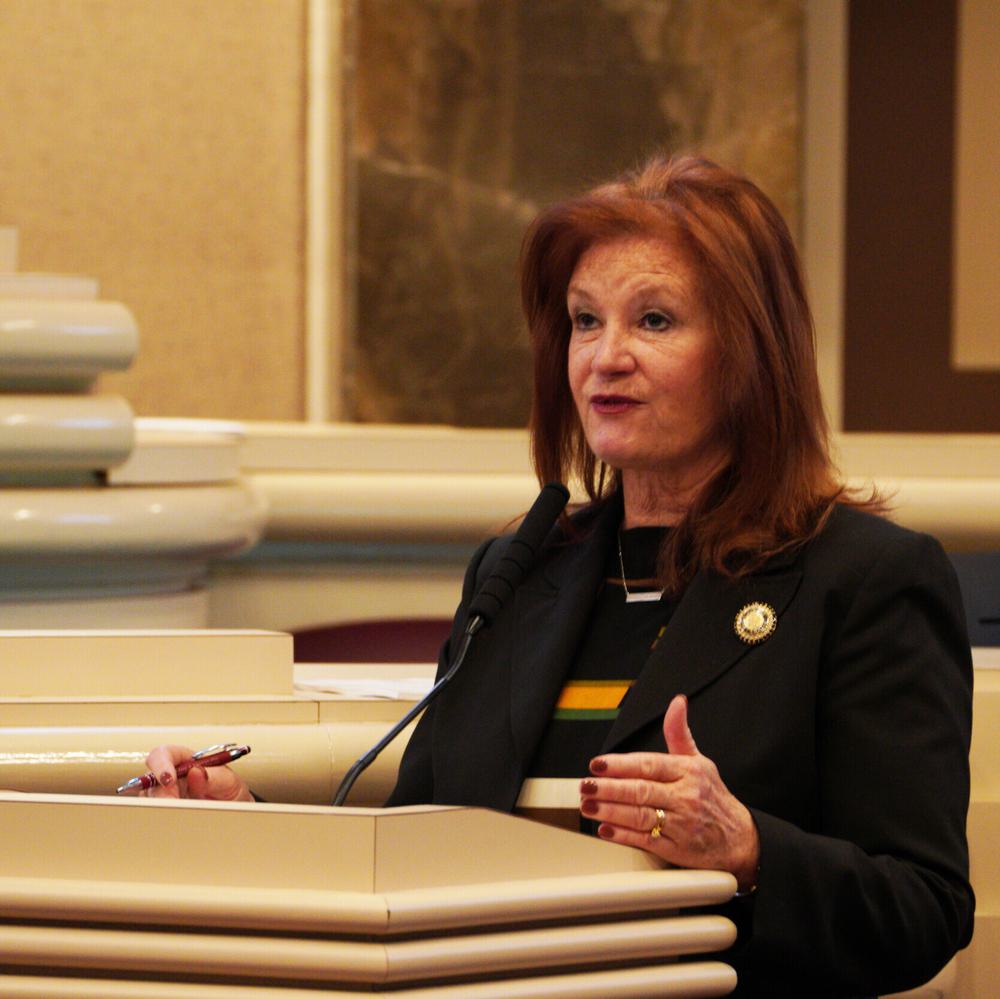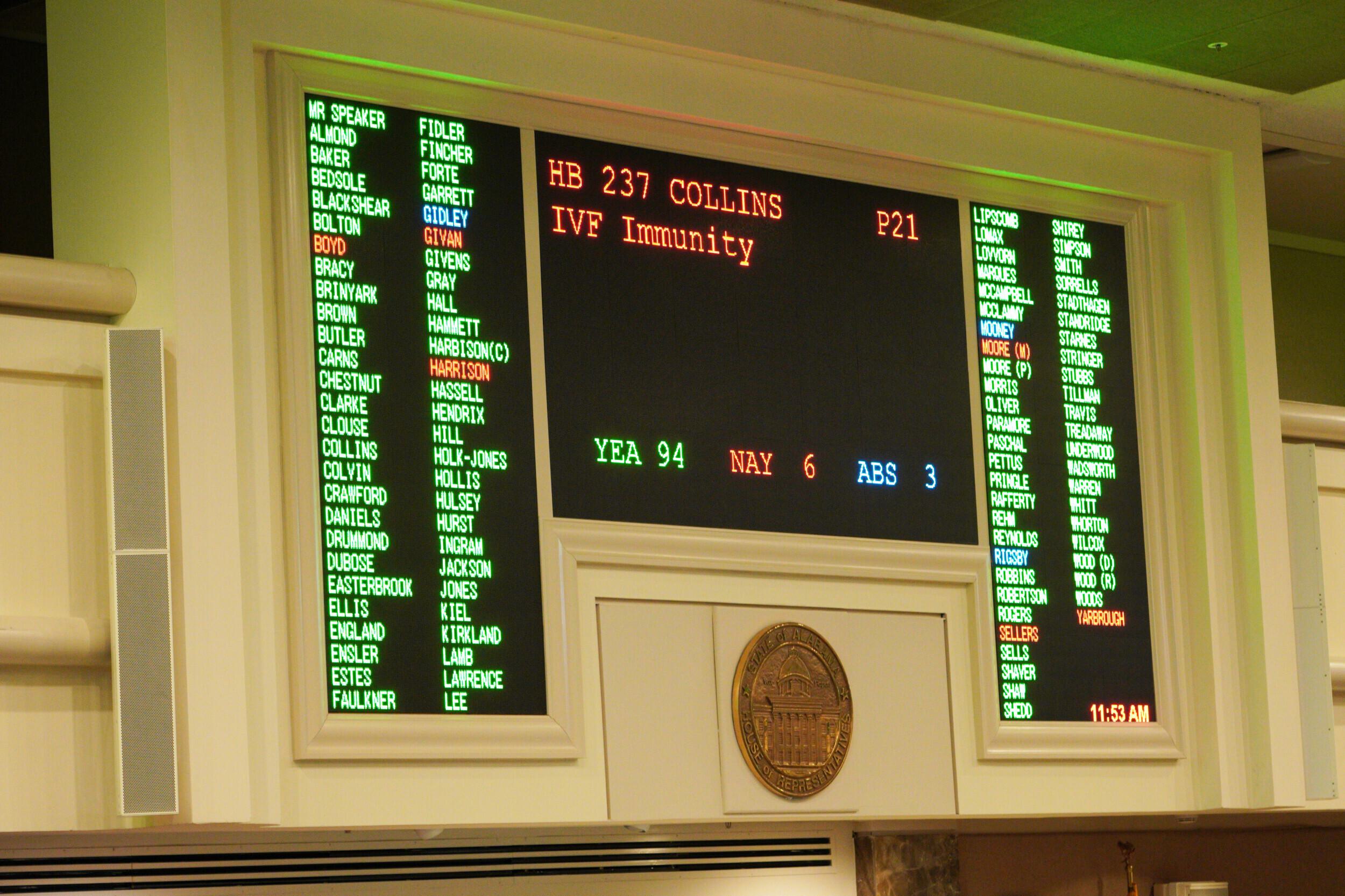MONTGOMERY— The Alabama House of Representatives passed a vote on Thursday to grant immunity to in-vitro fertilization (IVF) clinics after a recent Alabama Supreme Court decision grabbed national attention.
Many IVF clinics in the state have halted services after a case originating from Mobile, LePage v. Mobile Infirmary Clinic, Inc., the Supreme Court held in a 7-2 decision that parents of frozen embryos killed at an IVF clinic when an intruder tampered with a freezer may proceed with a wrongful death lawsuit against the clinic for alleged negligence.
House Bill 237 (HB237) by State Rep. Terri Collins (R-Decatur) would provide civil and criminal immunity to persons providing goods and services related to in vitro fertilization except for acts or omissions that are intentional and not arising from or related to IVF services.
HB237 is identical to a bill filed by State Sen. Tim Melson (R-Florence) in the Senate.
The bill moved swiftly through the committee on Wednesday after a public hearing was called off while supporters were still permitted to speak.
The original bill had a sunset provision, which was removed in the substitute. The original bill would also have applied retroactively, meaning the immunity provision would apply in the LePage civil case. However, the substitute would only use the retroactive provision for cases not currently involved in litigation.

Several speakers objected to removing the sunset because they wanted to ensure the legislature swiftly addressed further regulating IVF practices.
State Rep. Mark Gidley (R-Gadsden) pointed out his concerns with the legislation, joining multiple GOP lawmakers who wanted to see a lengthier conversation on additional regulations for IVF practices.
"Alabama is probably one of the most pro-life states in the nation. We cannot allow anything to interfere with our pro-life stand and the fact that life begins at conception," he stated. "I think that's not only a moral principle, that's a biblical principle as well."
Gidley also expressed concern about the IVF processes he has recently learned of.
"One of my main concerns is, of course, the embryos that are unused," Gidley stated. "I am also concerned about those entities who may take advantage of these families by using their embryos that are not respectful to life. And I can't stand for that. I can't tolerate that."
He continued, "That embryo wouldn't grow if it wasn't alive. It is a life. It is growing. And this is what is extremely important to me, and I think it's important to many members in this house to understand that once that is fertilized and it begins to grow, even though it may not be in the woman's uterus, it's a life. It's taking on a life. It's growing. It's living. It's a living being. It just needs to be implanted so it can continue to grow."
Collins agreed with Gidley and other speakers who wanted a comprehensive bill to regulate IVF practices. Collins expressed multiple times that HB237 intends to swiftly allow IVF clinics to proceed with operations as soon as possible.
"The moment we pass a comprehensive bill that deals with this, and I think also its extremely important that we have some regulations on these facilities, and if they choose to move away from doing these procedures, that's on them; that's not on us," Gidley said.
State Rep. Chris England (D-Tuscaloosa) said the bill forced the state to be "morally ambiguous and intellectually dishonest at the same time."
"So, in Alabama, for all intents and purposes, life begins at conception, and according to our constitution, those embryos have a right to life," England said.
"This immunity gives operations and doctors and medicine and all that stuff that goes on in IVF clinics immunity to do whatever is necessary to pursue fertility treatments, but we also know that in those same fertility treatments, embryos are discarded and embryos are destroyed. The immunity that we are providing here is limited so they can do that, isn't that correct?" he asked
Collins responded by saying she believed so, to which England responded by asking, "So, if, in fact, we have a constitutional amendment that requires us to adopt a public policy that these embryos have a right to life, can we pass a law that authorizes life to be taken in fertility clinics?"
"I don't believe within these five legislative days that we're trying to answer these clinics that we can come to a decision as a body that we all agree upon on those issues," Collins responded.
Several other Democratic lawmakers addressed the state's current abortion law, saying that Collins' bill would be ineffective in addressing current constitutional precedent and state law. Others, like State Rep. Mary Moore (D-Birmingham), gave the opinion that embryos don't have lungs and brains and are therefore not alive.
State Rep. Ernie Yarbrough (R-Trinity) posed the question of why lawmakers weren't discussing how to do IVF "in a pro-life way that treats embryos as children." He also said the Alabama Supreme Court may have "possibly uncovered a silent holocaust going on in our state."
"I was told things like, 'We need to be able to discard embryos the parents don't want,'" Yarbrough said. "I was told things by doctors in lab coats that we need to be able to test and discard embryos that we think may have genetic issues. I was in shock. You mean like down syndrome babies? You mean like special needs babies?"
Yarbrough offered an amendment that would remove immunity from those who "intentionally causes the death of an unborn child." Collins then motioned to table the amendment, which passed 65-26-6. Surprisingly, Democratic State Rep. Prince Chestnut spoke afterward, calling Yarbrough's amendment "good."
State Rep. Ben Harrison (R-Cartwright) also offered an amendment to create an IVF ad-hoc policy study committee.
"We can do this," Harrison said. "we do not need to grant immunity to murder. We need to begin working on this right now."
Collins also motioned to table that amendment, expressing a desire to leave the bill as it is, but was not ultimately opposed to a study commission. The motion to table passed 71-21-7.
House Majority Leader Scott Stadthagen (R-Hartselle) then entered a motion to cloture debate, which passed 74-28.
The final bill was ultimately passed with a vote of 94 yeas, six nays, and three abstentions.
To connect with the author of this story or to comment, email craig.monger@1819news.com.
Don't miss out! Subscribe to our newsletter and get our top stories every weekday morning.










